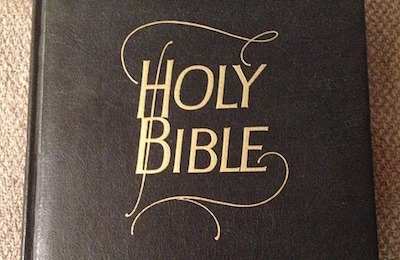|
Today's chapter covers two sermons and a prayer from Jeremiah. God stresses the importance of trusting in Him and keeping His Sabbaths. Jeremiah Chapter 17 Lessons from the text Overcoming the Sins of the Parent Do the sins of the parent carry over to a child? If Jane Doe is a sinner by everyone's standard, does that automatically make her daughter a sinner? A child will have a hard time turning away from the sins of the parent because that is what the child grew up with and views as normal behavior. For example, if you grow up in a house where cussing and drinking happens every single night, then you would think it is strange to go into a house where neither of those two things occurred. As you grow up, you would continue that behavior and expect your house to mimic the example set forth by your parents. You will always remember the life choices of your parents and as such, the sins of your parents will follow you throughout your entire life. Does the memory of that sin automatically mean that you will sin? Continuing the example, does this mean that you have to continue cussing and drinking throughout your entire life? Thankfully, no. As you become conscientious of right versus wrong, you can see the actions of your parents as sin and choose to not go down the same path. That is, after getting disapproving looks after cussing and carrying on, you begin to realize that not everybody lives the way your parents live. God has blessed each of us with a unique free will so that we are able to choose our own moral character regardless of the example set forth by parents or peers. It may be a long and difficult road to change the behaviors and life style that you have adopted from your parents, but it is possible. God will honor and bless the person who turns from wickedness to seek righteousness (Eze. 18:19-20). Verse by Verse Commentary A partridge. A partridge. 1 Opposed to the promise of hope given in the previous chapter, this new message returns to the theme of the consequences of sin. Not only is Judah's sin visible on the outside through altars to false gods, but also their sin has permeated them so thoroughly that the idolatry is engraved in their hearts. All the images of this verse invoke the thought of a permanent inscription. That is, Judah’s sin is permanently attached to them and therefore they must be removed from God's presence. 2 The children do not yet have the sin engraved in their hearts, but they do remember the idolatry. The sins of parents are easily transposed to their children because the children grow up seeing and believing in a way of life that is not righteous. 3-4 God laments over the sins of the people. Noteworthy is that everything which has been defiled by idolatry must be removed from the presence of God. God's anger against sin is as everlasting and His love of righteousness. Also noteworthy is that the fire which burns forever is used elsewhere to describe hell (Isa. 66:24, Rev. 20:14-15). 5-6 Compare with Psalm 118:8 and Proverbs 14-12. Man's knowledge and understanding are limited to the physical. He knows what he sees, which is the world, sin, and his flesh. God, however, sees all that in addition to the spiritual world which is hidden from the eyes of man. God has knowledge of the past, present, and future. As such, His knowledge far exceeds the knowledge of man, and so trusting in man's limited, and often skewed, knowledge is folly, leading man to trust in what is within his reach and build on the arrogant assumption that his knowledge is superior to God's. In response, God will bring a curse upon such a one. 7-8 Juxtaposed to those who trust in man's knowledge, those who put their confidence in God have trusted in He who is wiser and superior, and will therefore be blessed by God's faithfulness and wealth of knowledge. Even when troubles come, such a one draws from the truth and knowledge of God and is sustained, even thriving, in the midst of trouble. God is a shelter from the world, an unchanging dwelling place enabling one to be unaffected by the constant changes of the world. 9-10 The heart of man is wicked. Evil imaginations will flourish if left unchecked by parents and society. No human can see into another's mind to comprehend the desires of one's heart. God, however, can do so. In fact, He searches man's heart to see what abides therein and, depending on what He finds, responds to the person with either blessings or cursings, life or death. This is rightly understood as God's final judgment after death, since in this life God rains on the just and the unjust alike (Mt. 5:45). 11 A Partridge is a ground nesting bird which lives off of the seeds of the ground. It does not fly high or migrate and is rarely seen in a tree. God is saying that as a bird goes through the labor of building a nest, laying eggs, and keeping watch over them only to not be able to hatch them due to the death of the eggs or the spoiling of a predator, even so will those who obtain riches through unrighteous means, though they go through the effort of gathering, retaining, and feeding riches, will be unable to see their efforts come to fruition. 12-18 This passage is further evidence that the book of Jeremiah is not a record of his spoken words to the people but instead is an account of what he experiences as the Lord gives him these messages. Compare with Jeremiah 1:9, 2:1-2. 12 In conclusion to this message, Jeremiah gives praise to God. God's sanctuary is described as a high throne; through it the people have access to the heavenly places. 13 Jeremiah summarizes the sermon. Still full of the Holy Spirit, he speaks for himself and for God. 14-17 Jeremiah now prays for himself. He is still grieved that the people do not believe that he is speaking the word of the Lord but is instead making up judgments out of a desire to see harm fall on the people. Jeremiah knows that God is his only hope, especially against those who make him afraid to speak on God's behalf. Compare with Jeremiah 15:15-21. 18 Jeremiah wishes destruction on those who stand in the way of the preaching of God's word. Knowing that God's ways are the right ways, Jeremiah asks that he be not confused or amazed, thrown into doubt over circumstances, but instead that the wicked will be the ones thrown into confusion and doubt. 19-20 In response Jeremiah's prayer, God gives him a new message to preach, thus confirming that God is with Jeremiah. This new message is to be preached in the gates for the benefit of the merchants and travelers. 21-23 God reminds people of His fifth commandment: keep the Sabbath holy (Exo. 20:8-11). In remembrance of God resting after He created the universe, man is to work six days and do absolutely no work on the seventh day. The merchants and people are breaking this law by selling, trading, and traveling on the Sabbath. See also Exodus 16:22-30. 24-27 God promises to maintain the line of kings as long as the people are obedient to his commands. No evil will come upon the city because it will remain under God's divine protection as a place of worship. Compare with II Chronicles 7:17-22. God repeats the judgment of never ending fire (v. 4). ___________________ Thank you for your faithfulness in studying God’s word. Please comment below to share what you learned from today's lesson.
1 Comment
Kazadi Chibambi
10/26/2023 08:10:43 pm
Thanks
Reply
Leave a Reply. |
Devotional Categories
All
Archives
September 2023
|
|
Join my mailing list!
|
Thank you!You have successfully joined our subscriber list. |
|
© 2024 Melissa Beaty
|
